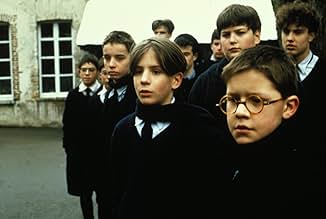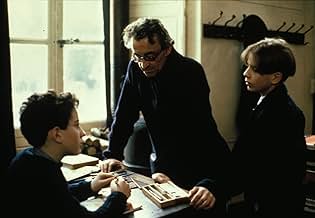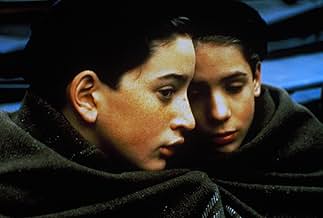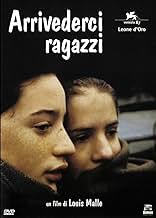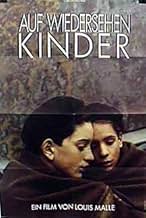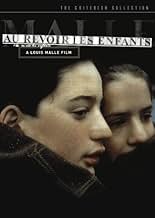Au revoir les enfants
- 1987
- Tous publics
- 1h 44m
IMDb RATING
8.0/10
38K
YOUR RATING
A French boarding school run by priests seems to be a haven from World War II until a new student arrives. Occupying the next bed in the dormitory to the top student in his class, the two yo... Read allA French boarding school run by priests seems to be a haven from World War II until a new student arrives. Occupying the next bed in the dormitory to the top student in his class, the two young boys begin to form a bond.A French boarding school run by priests seems to be a haven from World War II until a new student arrives. Occupying the next bed in the dormitory to the top student in his class, the two young boys begin to form a bond.
- Nominated for 2 Oscars
- 28 wins & 12 nominations total
Stanislas Carré de Malberg
- François Quentin
- (as Stanislas Carré De Malberg)
Luc Etienne
- Moreau
- (as Luc Étienne)
- Director
- Writer
- All cast & crew
- Production, box office & more at IMDbPro
Featured reviews
An elegantly crafted tale of friendship, compassion & boyhood, Au Revoir Les Enfants is a heartbreaking, poignant & tragic cinema that's actually based on the events which took place during the childhood of this film's director and is an endearing portrait of life at school, student rivalry & beauty of friendship.
Set in France during the final years of the Second World War, the events of Au Revoir Les Enfants takes place in a Catholic boarding school and is narrated through the eyes of Julien Quentin; one of the students at the school. The plot covers his relationship with a newly arrived enigmatic student with whom he's at odds at first but the two learn to get along & share a big secret.
Directed by Louis Malle, the film is nicely crafted with many details beautifully captured by its calmly moving camera. The screenplay tries to get an authentic vibe of education in Catholic schools, the conversations between its characters carry the childlike innocence & the performances by its cast, especially the child actors, becomes more captivating as the story progresses.
On an overall scale, Au Revoir Les Enfants (also known as Goodbye Children) isn't in anyway a hard-hitting or emotionally scarring cinema but the gentle manner in which it depicts its premise really makes you care for its characters, makes you wish they get away, makes you wish for a miracle & although its subject matter has been dealt in a better manner, the film is worthy of a watch for its two main characters alone.
Set in France during the final years of the Second World War, the events of Au Revoir Les Enfants takes place in a Catholic boarding school and is narrated through the eyes of Julien Quentin; one of the students at the school. The plot covers his relationship with a newly arrived enigmatic student with whom he's at odds at first but the two learn to get along & share a big secret.
Directed by Louis Malle, the film is nicely crafted with many details beautifully captured by its calmly moving camera. The screenplay tries to get an authentic vibe of education in Catholic schools, the conversations between its characters carry the childlike innocence & the performances by its cast, especially the child actors, becomes more captivating as the story progresses.
On an overall scale, Au Revoir Les Enfants (also known as Goodbye Children) isn't in anyway a hard-hitting or emotionally scarring cinema but the gentle manner in which it depicts its premise really makes you care for its characters, makes you wish they get away, makes you wish for a miracle & although its subject matter has been dealt in a better manner, the film is worthy of a watch for its two main characters alone.
10Sloke
The movie was a project close to Louis Malle's heart (he was in tears when the film premiered at a film festival in 1987) and it shows in the multi-layered treatment he gives the central setting, this fascinating boarding school with its broad cast of characters. Because there are so many different strands and affecting moments tangential to the central plot, one is not entirely prepared for the finale even if you are expecting it. French film is characteristically digressive, often to a fault, but here it works to splendid advantage. It also lends itself to repeat viewings.
I don't think you need to have lived in occupied Europe to appreciate this wonderful film; it speaks to all of us who have lived through childhood's quickly-passing parade and know its lifelong regrets. That last image of the stone wall is emblazoned in many consciousnesses, as it is in mine.
There are many interesting choices Malle makes in this film. For example, while the central subject is the Holocaust, nearly all the Germans we actually see in the film are fairly decent if nonetheless menacing types. The real villains here are almost entirely French collaborators, which was done I think to call attention to collaboration during a period when the French were dealing with the Klaus Barbie trial. [Barbie was a Gestapo officer who was aided in his work rooting out Resistance leaders by many French collaborators.] But casting French people as the heavies also suggests the central evil of prejudice and oppression is not something exclusive to one nationality, and it broadens the scope of the movie.
The tender treatment Malle affords the Catholic hierarchy in the movie is unusual, too, when you see other more anti-clerical Malle efforts like "Murmur of the Heart." There is an unexpected sense of spirituality throughout this film, somewhat muted but there all the same.
This may well stand as the cinematic masterpiece of a man who, at his best (see also "Atlantic City" and "My Dinner With Andre") was to motion pictures what his countrymen Zola and Hugo were to novels: An artist who filled his canvas with the verve and breadth of human life.
I don't think you need to have lived in occupied Europe to appreciate this wonderful film; it speaks to all of us who have lived through childhood's quickly-passing parade and know its lifelong regrets. That last image of the stone wall is emblazoned in many consciousnesses, as it is in mine.
There are many interesting choices Malle makes in this film. For example, while the central subject is the Holocaust, nearly all the Germans we actually see in the film are fairly decent if nonetheless menacing types. The real villains here are almost entirely French collaborators, which was done I think to call attention to collaboration during a period when the French were dealing with the Klaus Barbie trial. [Barbie was a Gestapo officer who was aided in his work rooting out Resistance leaders by many French collaborators.] But casting French people as the heavies also suggests the central evil of prejudice and oppression is not something exclusive to one nationality, and it broadens the scope of the movie.
The tender treatment Malle affords the Catholic hierarchy in the movie is unusual, too, when you see other more anti-clerical Malle efforts like "Murmur of the Heart." There is an unexpected sense of spirituality throughout this film, somewhat muted but there all the same.
This may well stand as the cinematic masterpiece of a man who, at his best (see also "Atlantic City" and "My Dinner With Andre") was to motion pictures what his countrymen Zola and Hugo were to novels: An artist who filled his canvas with the verve and breadth of human life.
This is a very moving film, most likely based on an actual event. The Carmelite priest,Lucien Bunel (1900-1945, "Pere Jacques") was founder and director of the Petit College d'Avon, near Fontainebleau. He was arrested on Jan. 15, 1994, accused of hiding 3 Jewish boys among his students, and was deported to the infamous Mauthausen concentration camp. He died in Linz, Austria on June 2, 1945. Malle's film depicts the intense trauma of Jewish children who were separated from their families and forced to take on a new identity in hiding, always afraid of being found out. They also faced the dilemma of how to maintain their Jewishness in the setting of a Catholic school. So, not just another war movie, this film depicts some of the real struggles facing hidden children, many of whom were saved by courageous Christians in Europe.
Au Revoir Les Enfants (1987)
A wrenching, sensitive, all-too-true drama set in a gorgeous French wooded outpost during World War II. The main actors are boys, and they play their parts with unusual conviction, unexaggerated but with intensity. And the anti-Semitism that arises, though inevitable in Nazi territory, comes subtly and really stings. The movie isn't complete without this horror, but the horror is made complete by the really vivid recreation of this kind of private boys school--a period movie at its best.
Director Louis Malle has not only a message, but a sensitive feel for the medium--for making fluid the flow and background of the plots of his films. It's also a fairly complex mix of types, and you can somehow keep them all straight as it goes--as straight as you are meant to as the facts unfold. In the end, it confirms a familiar story of Nazi terror, but one that can't be told too often.
A wrenching, sensitive, all-too-true drama set in a gorgeous French wooded outpost during World War II. The main actors are boys, and they play their parts with unusual conviction, unexaggerated but with intensity. And the anti-Semitism that arises, though inevitable in Nazi territory, comes subtly and really stings. The movie isn't complete without this horror, but the horror is made complete by the really vivid recreation of this kind of private boys school--a period movie at its best.
Director Louis Malle has not only a message, but a sensitive feel for the medium--for making fluid the flow and background of the plots of his films. It's also a fairly complex mix of types, and you can somehow keep them all straight as it goes--as straight as you are meant to as the facts unfold. In the end, it confirms a familiar story of Nazi terror, but one that can't be told too often.
After a few years making movies in the United States, Louis Malle returned to his native France and made "Au revoir les enfants", based on his memories of growing up in Nazi-occupied France. The movie focuses on the friendship between two boys in a Carmelite boarding school, one of whom is keeping his real identity secret.
A particularly effective scene is in the restaurant. There are some Wehrmacht officers at a table, but they keep to themselves. Then the Milice enters and orders a Jewish patron out of the restaurant. The Wehrmacht officers then order the Milice to leave. This emphasizes not only the role of the Vichy government, but also the role of the collaborators in every country that Germany occupied.
I haven't seen all of Malle's movies, but this is probably the best of his movies that I've seen. The final scene has to be one of the most chilling in cinema history. I recommend the movie.
A particularly effective scene is in the restaurant. There are some Wehrmacht officers at a table, but they keep to themselves. Then the Milice enters and orders a Jewish patron out of the restaurant. The Wehrmacht officers then order the Milice to leave. This emphasizes not only the role of the Vichy government, but also the role of the collaborators in every country that Germany occupied.
I haven't seen all of Malle's movies, but this is probably the best of his movies that I've seen. The final scene has to be one of the most chilling in cinema history. I recommend the movie.
Did you know
- TriviaBased on an incident from Louis Malle's own youth. Julien is modeled after Malle.
- GoofsWhen hiking, Julien asks what day it is and is told that it's Thursday, January 17th, 1944. That date was actually a Monday.
- Crazy creditsPour Cuotemoc, Justine et Chloé. (opening credits)
- How long is Au Revoir les Enfants?Powered by Alexa
Details
- Release date
- Countries of origin
- Official site
- Languages
- Also known as
- Le nouveau
- Filming locations
- Production companies
- See more company credits at IMDbPro
Box office
- Gross US & Canada
- $4,542,825
- Gross worldwide
- $4,575,613
- Runtime1 hour 44 minutes
- Color
- Sound mix
- Aspect ratio
- 1.66 : 1
Contribute to this page
Suggest an edit or add missing content


![Watch Bande-annonce [VOST]](https://m.media-amazon.com/images/M/MV5BZDlkMTI5OTgtNmU4My00MzRjLWFkNzMtYmMyMDlhNjQ2OTFmXkEyXkFqcGdeQXRyYW5zY29kZS13b3JrZmxvdw@@._V1_QL75_UX500_CR0)
